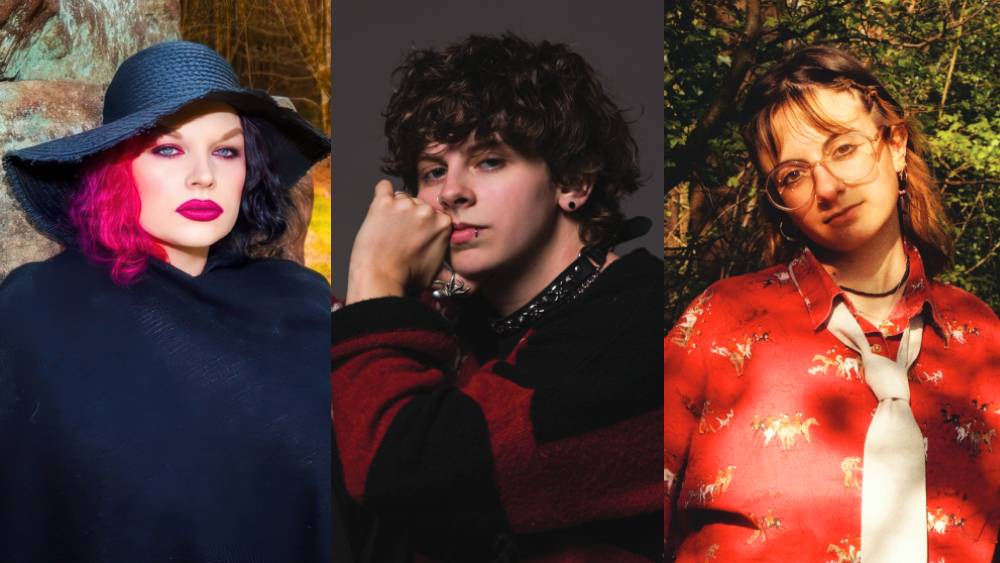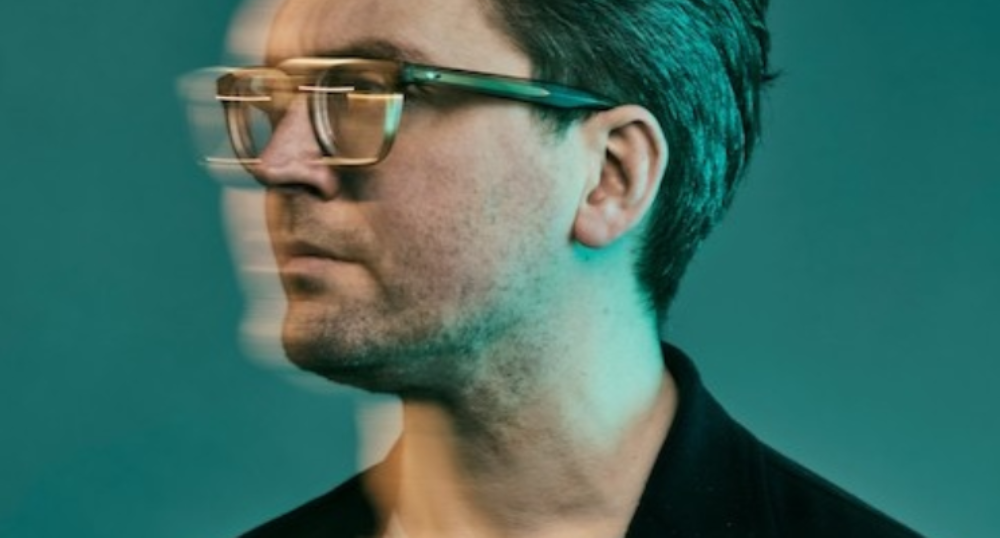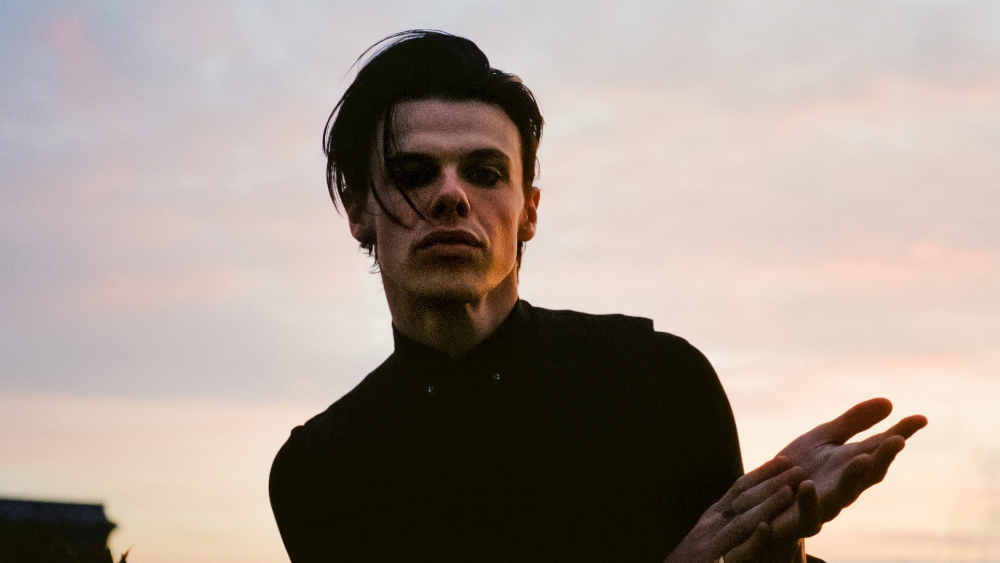Jasmine.4.t’s Manchester bedroom resembles a neatly curated Pinterest board, bursting with pastel-coloured trinkets, art prints, festival passes and handwritten letters and postcards. The songwriter, with her dip-dyed hair tied in a scrunchie, carries her laptop around to show M her surroundings over Zoom, eyes gleaming as she recalls the stories behind some of her most prized possessions.
‘I really love my fans, they're my friends,’ she says, lifting a crochet flower bouquet towards the camera. ‘I’m so grateful that my room is full of gifts from them.’
This relationship is intrinsic to Jasmine’s life as a touring artist, through which she is aiming to make live music inclusive for all. On her Instagram, she posts accessibility guides ahead of her headline shows, including information for wheelchair users and gender-neutral toilet options. In return, her followers frequently send her tips for queer and vegan spaces while she’s on the road.
Jasmine’s current tour is in promotion of her debut album You Are The Morning. Released in January and produced by Grammy winners Boygenius, it’s a warm, generous collection overflowing with indie flourishes and creative spirit. The record also charts her journey towards living freely as a trans woman and embracing her identity, emphasising melody and powerful reflections on growth.
After performing at SXSW in Austin, Texas back in March (funded by PRS Foundation’s International Showcase Fund) Jasmine is now looking ahead to her debut North American headline tour, kicking off in Toronto on 26 September, ahead of a run of shows in the UK and Europe.
Ahead of those dates, M caught up with the singer-songwriter for the latest edition of our On The Road series to hear, in her own words, what it's been like to grow and thrive as a live act in 2025.
‘I feel like our shows have become very important community spaces, especially for trans women. It’s a really shit time for trans people around the world, so having these places where we can come together and meet each other — and I've had a lot of girls reach out to me and tell me that they've met their new best friends at my shows — means the world to me. I met all of my chosen family at queer events when I moved to Manchester, so being able to create those spaces for others is such a nice feeling.
‘I have ME [myalgic encephalomyelitis, or chronic fatigue syndrome], which means I am tired a lot of the time. I’ve learned how to manage that while touring, and maintaining your energy levels also means you can do fun things in your free time. It’s something that Lucy [Dacus, Boygenius] takes very seriously; when you're touring, spending your day off in the hotel room is sometimes counterproductive. Experiencing a foreign city and then having a nice, restful evening is usually a better way to feel energised.
‘PRS Foundation’s financial support meant that we were able to go to SXSW back in March and have this incredible experience, which opened up so many doors for us. Without that support, I think I would have really struggled to pay my band. We actually made a profit from going to SXSW, which is unheard of. I managed to pass on some of our earnings back to my community through a charity called Trans Mutual Aid Manchester, whom I work with quite a lot.
‘The next trip to the US after SXSW was opening for Lucy, and we played at some really incredible places: [New York’s] Radio City Hall, the Chicago Theatre, The Anthem in Washington D.C., the Greek Theatre in L.A. The one that really stood out to me, though, was playing at Red Rocks Amphitheatre [in Morrison, Colorado]. I’d seen it on the internet, but being there in real life was breathtaking. It’s incredible, it's so big — it made my brain explode!
'Our shows have become very important community spaces, especially for trans women.'
‘Feeling the solidarity from the audiences on that US tour meant the world to me. I often talk about what's going on in the UK for trans rights, which is terrible. We've had the puberty blocker ban, which has massively increased the suicide rate in trans children; we've had this ruling that trans women are no longer women, and trans men are no longer men — legally. That international solidarity, though, felt like a really loud form of love for us on stage.
‘However, in going to the US as trans women, they made us reapply for our visa as men because of [Donald] Trump's Executive Order. I now have a “special” stamp in my passport that says I'm trans, which is terrifying. Any time I have to cross a border, it puts me in danger. Trans women are subjected to strip searches at the American border quite regularly as a humiliation tactic. That hasn't happened to us yet, but it is very common. The thought of it is incredibly traumatising and is very present in our minds.
‘Trans women are often targeted by police, and terrible things happen to trans women at men's detention centres, as you can imagine. A lot of trans women don't survive those experiences. These are the kinds of dangers that we're putting ourselves in [to tour]. We've had self-defence classes. We have a lot of anxieties around this violence from the state, especially at borders as travelling musicians.
‘Yet even at all these festivals we've been playing, which aren't queer events, it's been amazing to see how everyone is on our side. The general public loves trans women, trans men, trans children and non-binary people. It's a very small proportion of the elite who are creating these anti-trans laws.
‘Touring has offered a lovely reminder of the support behind us. We want to be visible role models for other trans people: if you can see it, you can be it. Being a successful musician as a trans woman isn't a very common thing, though we're very underrepresented in all industries. Given that I have that opportunity, it feels very important to step into the limelight.’
You can see full details of jasmine.4.t's upcoming tour here. Main photo credit: Jessica Carroll.
Played live recently? Find out more about how you can earn royalties when you report your setlists to PRS.





